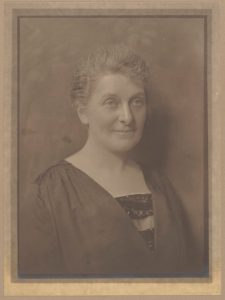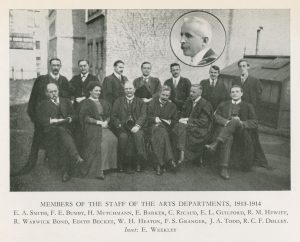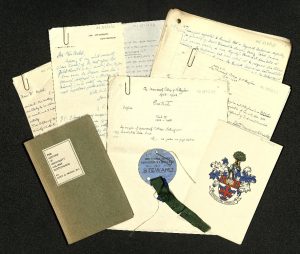March 10, 2022, by Kathryn Steenson
International Women’s Day: Dr Edith Becket
Dr Edith M Beckett (1877-1952) was one of the earliest students of University College, Nottingham, where she obtained a London BA degree in 1898. Unlike some universities, London (and thus by extension University College Nottingham, which did not award its own degrees) allowed female students to earn a degree, rather than simply complete their studies and leave without a qualification.
She joined the staff of the Department of Education in 1900 and worked there for 47 years until her retirement. In 1922 she was awarded an MA for a dissertation on the history of education in the City of Nottingham, and in 1936 she obtained her PhD for her thesis on ‘The History of Education and of Educational Institutions in Nottinghamshire excluding the City of Nottingham from 1800-1930‘.

Photograph of Edith M. Becket, Senior lecturer in Education and Women’s Tutor in Secretarial Training Department, University College Nottingham, 1928. Ref: UMP/2/4/50
Dr Becket’s principal interest was in the history of education and after her retirement in 1947 she continued to undertake research until her death on 13th October 1952 at the age of 75. She is best remembered for her contribution to the University’s history with her book University College, Nottingham, published in 1928, for which we hold both the published version and her research notes and drafts in MS 559: Papers of Dr Edith M. Becket. This small collection consists of research papers relating to various stages of Dr Becket’s work on the history of education in Nottingham, and the history of University College Nottingham in particular. It reflects the work undertaken by Dr Beckett when asked by Principal Wortley to extend her history of the College to cover the period 1928-1949 and the institution’s transition from the University College to The University of Nottingham in 1948. A small number of letters from colleagues are also present, referring in general to aspects of institutional history.
There is nothing in the way of personal papers, and it’s frustrating that we have very little idea of her life outside of work. And, like many of the academics in the early 20th century, her primary focus was on teaching, as the University College Nottingham had been set up to provide academic and vocational qualifications rather than as a research institution. For example, the Department of Education began life as the Day Training College, established in 1890 to train elementary teachers. A royal commission on elementary education in 1888 recommended sending students who intended to become teachers to be trained at university institutions. Nottingham’s Day Training College was among the first five to be accepted by the Board of Education. In 1890 it welcomed the first 30 students under Mr Amos Henderson, who later became the college’s first professor of education.

Members of staff of the Arts Department, University College, nottingham, 1913-1914. ‘A History of the University College, Nottingham’ by A.C. Wood (1953).
The two-year training course offered by the college was stopped in 1934 for women and in 1937 for men. It was replaced by a four year course comprising a three year degree and one year postgraduate teacher training. It was replaced by the Department of Education which in turn merged with the Institute of Education to form the School of Education in 1970.
Later this year we hope to host an exhibition on the history of Adult Education Department at Nottingham. Technically it was founded 100 years ago this year, but it’s aim was actually very close to the original intention of University College Nottingham when it first opened its doors in the 1880s.
No comments yet, fill out a comment to be the first


Leave a Reply